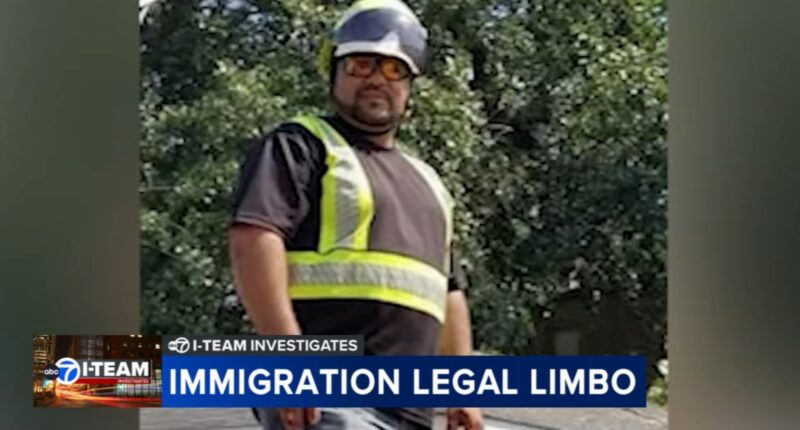LYONS, Ill. (WLS) — President Donald Trump and his administration have been emphasizing the removal and deportation of the “worst first” in their mass deportation plans. This strategy has been ongoing since the beginning of his second term in office.
Despite this approach, the ABC 7 I-Team has been monitoring a case where a father, who has resided in the Chicago area for many years without any criminal record, finds himself in a legal limbo. He remains detained while his immigration case experiences continuations and delays, leaving his family in suspense.
ABC7 Chicago is now streaming 24/7. Click here to watch
Abel Orozco Ortega, a business owner, was taken into custody by immigration agents outside his home in suburban Lyons during a U.S. Immigration and Customs Enforcement operation in late January. Orozco Ortega’s lawyer mentioned that he was apprehended as a collateral arrest.
Since then, Orozco Ortega has remained behind bars in an ICE detention center in Indiana for nearly four months.
“Detention is a very grueling and difficult process, and he’s very, very worried,” Orozco Ortega’s attorney Colleen Ward with the National Immigrant Justice Center said. “He’s worried about his wife. He’s worried about his children, his grandchildren, his employees.”
On Tuesday morning, for the second time this month, Orozco Ortega’s case went before a federal immigration judge, only to find out the case would be continued again with no action taken until next month.
“ICE said that they haven’t come to a decision,” Ward said. “So unfortunately, that meant that the case was delayed a further two weeks.”
Orozco Ortega’s attorneys have argued nearly two dozen people arrested by ICE this year, including Orozco, were detained in violation of a past legally binding agreement — called the “Castañon Nava” settlement — surrounding how agents conduct immigration enforcement.
Orozco Ortega is a Mexican immigrant who’s lived in the U.S. for nearly 30 years. He does not have permanent legal status.
Orozco Ortega’s family and attorney say he had no criminal record, only a removal order after returning from a visit to Mexico in 2004.
Ward is arguing for Orozco Ortega’s due process rights in the case.
“It’s a fundamental question of due process and allowing Mr. Orozco to be able to present all the evidence in his case,” Ward explained.
Immigration enforcement has been a top policy priority during President Trump’s second term. He shared his renewed focus on enforcement at a West Point commencement address over the weekend.
“They’ve allowed people to come into our country that shouldn’t be, that shouldn’t be here,” Trump said. “We’re getting them out and bringing them back where they came from.”
While the president and his Department of Homeland Security officials continue to boast about mass deportations, data from Syracuse University’s Transactional Records Access Clearinghouse, or TRAC, reflect what they call the reality of removals.
Researcher Susan Long is the co-founder of TRAC.
“(The administration has) just sort of made up numbers and said, ‘Oh, everything’s skyrocketing,’ and it simply doesn’t accord with what another branch is publishing that is required by Congress,” Long said.
For instance, Homeland Security officials claimed to have arrested 151,000 migrants and deported 135,000 in their first 100 days. It is more, they claimed, than the Biden administration in all of 2024.
But TRAC analyzed Homeland Security reports to Congress and found the Trump administration actually arrested roughly half that many migrants – 76,212 people — and removed or deported fewer than half of what they claimed — 72,179.
Meanwhile, the administration said it has made serious headway on illegal border crossings.
Illegal border crossings have plummeted since President Trump returned to the White House, leading to “its lowest southwest border crossings in history,” according to U.S. Customs and Border Protection figures published last month.
Ward believes ICE arrests like Orozco’s are more about hitting a quota versus public safety.
“He’s a grandfather. He’s a small business owner,” Ward said. “And whether or not a 20-plus-year-old expedited removal order is going to be utilized to try to hit what appears to be a quota — not to enforce any kind of public safety or any other priority.”
Copyright © 2025 WLS-TV. All Rights Reserved.

















